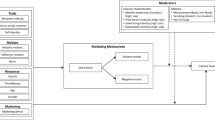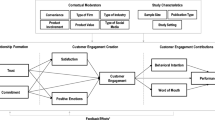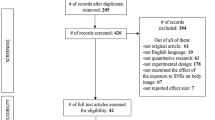Abstract
Empowerment-themed advertisements are becoming an attractive marketing strategy for companies due to their popularity among female consumers, but there is no known empirical work examining their effectiveness at increasing women’s felt empowerment. The explicit narrative of these ostensibly empowering advertisements seems empowering, but the visual messages still resemble traditionally objectifying campaigns, which have been known to lead to objectification in women. This series of two experiments measures the effects of nominally empowering messages on women’s post-exposure feelings of empowerment and self-objectification. In Experiment 1, 135 U.S. college women were randomly assigned to view ostensibly empowering beauty advertisements, traditional beauty advertisements, or control advertisements. They then completed a measure of state objectification and participated in a 3-min public speaking exercise as a measure of apparent empowerment. In Experiment 2, a more diverse sample of 326 U.S. women completed an online version of the study with a new measure of felt empowerment. Results of both experiments indicated higher state objectification following exposure to traditional beauty advertisements as compared to control advertisements, with some evidence indicating that the ostensibly empowering beauty advertisements also primed state objectification. Reported self-efficacy (Experiment 1) and felt empowerment (Experiment 2) did not differ by condition, but speech performance was judged as more empowered for individuals who saw the ostensibly empowering ad. We discuss potential explanations for the findings and offering suggestions for improving the effectiveness of these advertisements while decreasing risk of self-objectification.
Similar content being viewed by others
References
Abitbol, A. (2016). You act like a girl: An examination of consumer perceptions of femvertising. Quarterly Review of Business Disciplines, 3(2), 117–138.
Akestam, N., Rosengren, S., & Dahlen, M. (2017). Advertising “ like a girl ”: Toward a better understanding of “ femvertising ” and its effects. Psychology & Marketing, 34, 795–806. https://doi.org/10.1002/mar.21023.
Aubrey, J. S. (2006). Exposure to sexually objectifying media and body self-perceptions among college women: An examination of the selective exposure hypothesis and the role of moderating variables. Sex Roles, 55(3–4), 159–172. https://doi.org/10.1007/s11199-006-9070-7.
Aubrey, J. S., Henson, J. R., Hopper, K. M., & Smith, S. E. (2009). A picture is worth twenty words (about the self): Testing the priming influence of visual sexual objectification on women’s self-objectification. Communication Research Reports, 26(4), 271–284. https://doi.org/10.1080/08824090903293551.
Aubrey, J. S., Hopper, K. M., & Mbure, W. G. (2011). Check that body! The effects of sexually objectifying music videos on college men’s sexual beliefs. Journal of Broadcasting & Electronic Media, 55(3), 360–379. https://doi.org/10.1080/08838151.2011.597469.
Bushman, B. J. (1998). Priming effects of media violence on the accessibility of aggressive constructs in memory. Personality and Social Psychology Bulletin, 24(5), 537–545. https://doi.org/10.1177/0146167298245009.
Bushman, B. J., Gollwitzer, M., & Cruz, C. (2015). There is broad consensus: Media researchers agree that violent media increase aggression in children, and pediatricians and parents concur. Psychology of Popular Media Culture, 4(3), 200–214. https://doi.org/10.1037/ppm0000046.
Charmes, J., & Wieringa, S. (2003). Measuring women's empowerment: An assessment of the gender-related development index and the gender empowerment measure. Journal of Human Development, 4(3), 419–435. https://doi.org/10.1080/1464988032000125773.
Chen, G., Gully, S. M., & Eden, D. (2001). Validation of a new general self-efficacy scale. Organizational Research Methods, 4(1), 62–83. https://doi.org/10.1177/109442810141004.
Ciambriello, R. (2014, October 3). How ads that empower women are boosting sales and bettering the industry. Adweek. Retrieved from https://www.adweek.com/brand-marketing/how-ads-empower-women-are-boosting-sales-and-bettering-industry-160539/.
Couture, A., & Harrison, K. (2018, May). Measuring empowerment: Validation of the Affective Empowerment Checklist (AECL). Manuscript presented at the ICA 68th Annual Convention, Prague.
de Freitas, C., Jordan, H., & Hughes, E. K. (2018). Body image diversity in the media: A content analysis of women’s fashion magazines. Health Promotion Journal of Australia, 1–6. https://doi.org/10.1002/hpja.21.
Deighton, J. (2008, March). Dove: Evolution of a brand. Harvard Business School Case 508-047. Retrieved from https://www.hbs.edu/faculty/Pages/item.aspx?num=35026.
Diener, E., & Biswas-Diener, R. (2005). Psychological empowerment and subjective well-being. In D. Narayan (Ed.), Measuring empowerment: Cross disciplinary perspectives (pp. 125–140). Washington, DC: The World Bank.
Dove. (2019). The Dove self-esteem project: Our mission in action. Retrieved from https://www.dove.com/us/en/dove-self-esteem-project/our-mission/the-dove-self-esteem-project-our-mission-in-action.html.
Erchull, M. J., & Liss, M. (2014). The object of one’s desire: How perceived sexual empowerment through objectification is related to sexual outcomes. Sexuality & Culture, 18(4), 773–788. https://doi.org/10.1007/s12119-013-9216-z.
Fredrickson, B. L., & Roberts, T. A. (1997). Objectification theory: Toward understanding women’s lived experiences and mental health risks. Psychology of Women Quarterly, 21, 173–206. https://doi.org/10.1111/j.1471-6402.1997.tb00108.x.
Fredrickson, B. L., Roberts, T.-A., Noll, S. M., Quinn, D. M., & Twenge, J. M. (1998). “That swimsuit becomes you: Sex differences in self-objectification, restrained eating, and math performance”: Correction to Fredrickson et al. (1998). Journal of Personality and Social Psychology, 75(5), 1098–1098. https://doi.org/10.1037/h0090332.
Gapinski, K. D., Brownell, K. D., & Lafrance, M. (2003). Body objectification and “ fat talk ”: Effects on emotion, motivation, and cognitive performance. Sex Roles, 48(9–10), 377–388. https://doi.org/10.1023/A:1023516209973.
Gay, R. K., & Castano, E. (2010). Fast track report my body or my mind: The impact of state and trait objectification on women’s cognitive resources. European Journal of Social Psychology, 40, 695–703. https://doi.org/10.1002/ejsp.
Gill, R. (2003). From sexual objectification to sexual subjectification: The resexualisation of women's bodies in the media. Feminist Media Studies, 3(1), 100–106. https://doi.org/10.1080/1468077032000080158.
Gill, R. (2008). Empowerment/sexism: Figuring female sexual agency in contemporary advertising. Feminism & Psychology, 18(1), 35–60. https://doi.org/10.1177/0959353507084950.
Goodman, B. J. R., Morris, J. D., & Sutherland, J. C. (2008). Is beauty a joy forever? Young women’s emotional responses to varying types of beautiful advertising models. Journalism & Mass Communication Quarterly, 85(I), 147–168. https://doi.org/10.1177/107769900808500110.
Griner, D (2014, February 24). Ad of the day: P&G surges at Olympic finish line with CoverGirl’s ‘girls can’ campaign. Adweek. Retrieved from https://www.adweek.com/brand-marketing/ad-day-pg-surges-olympic-finish-line-covergirls-girlscan-campaign-155912/.
Hallgren, K. A. (2012). Computing inter-rater reliability for observational data: An overview and tutorial. Tutor Quant Methods Psychology, 8(1), 23–34.
Halliwell, E., Malson, H., & Tischner, I. (2011). Are contemporary media images which seem to display women as sexually empowered actually harmful to women? Psychology of Women Quarterly, 35(1), 38–45. https://doi.org/10.1177/0361684310385217.
Harper, B., & Tiggemann, M. (2008). The effect of thin ideal media images on women's self-objectification, mood, and body image. Sex Roles, 58, 649–657. https://doi.org/10.1007/s11199-007-9379-x.
Harrison, K. (2000). The body electric: Thin-ideal media and eating disorders in adolescents. Journal of Communication, 50(3), 119–143. https://doi.org/10.1111/j.1460-2466.2003.tb02587.x.
Harrison, B. K., & Fredrickson, B. L. (2003). Women’s sports media, self-objectification, and mental health in Black and White adolescent females. Journal of Communication, (June), 216–232. https://doi.org/10.1111/j.1460-2466.2003.tb02587.x.
Harrison, K., & Hefner, V. (2014). Virtually perfect: Image retouching and adolescent body image. Media Psychology, 17(2), 134–153. https://doi.org/10.1080/15213269.2013.770354.
Hayes, A. F. (2013). Introduction to mediation, moderation, and conditional process analysis: A regression-based approach. New York: Guilford Press.
Kapoor, D., & Munjal, A. (2017). Self-consciousness and emotions driving femvertising: A path analysis of women's attitude towards femvertising, forwarding intention and purchase intention. Journal of Marketing Communications, 25(2), 137–157. https://doi.org/10.1080/13527266.2017.1338611.
Karsay, K., Knoll, J., & Matthes, J. (2018). Sexualizing media use and self-objectification: A meta-analysis. Psychology of Women Quarterly, 42(1), 9–28. https://doi.org/10.1177/0361684317743019.
Kilbourne, J. (2010). Killing us softly 4: Advertising's image of a woman [motion picture]. United States: Media Education Foundation.
Livne, Y., & Rashkovits, S. (2018). Psychological empowerment and burnout: Different patterns of relationship with three types of job demands. International Journal of Stress Management, 25(1), 96–108. https://doi.org/10.1037/str0000050.
McLean, S. A., Paxton, S. J., & Wertheim, E. H. (2016). The role of media literacy in body dissatisfaction and disordered eating: A systematic review. Body Image, 19, 9–23. https://doi.org/10.1016/j.bodyim.2016.08.002.
Morris, P. K., & Nichols, K. (2013). Conceptualizing beauty: A content analysis of U.S. and French women’s fashion magazine advertisements. Online Journal of Communication and Media Technologies, 3(1), 49–74.
Muller, S. (2015, May 18). Why 'fem-vertising' is working for lane Bryant, Pantene, Nike, under Armour, always. Forbes. Retrieved from https://www.forbes.com/sites/onmarketing/2015/05/18/why-fem-vertising-is-working-for-lane-bryant-pantene-nike-under-armour-always/#333f4e9f16b2.
Narayan, D. (Ed.). (2005). Measuring empowerment: Cross disciplinary perspectives. Washington, DC: The World Bank.
Neff, J. (2014, January 22). Ten years in, Dove's 'real beauty' seems to be aging well. Advertising Age. Retrieved from adage.com/article/news/ten-years-dove-s-real-beauty-aging/291216/.
Pennell, H., & Behm-Morawitz, E. (2015). The empowering (super) heroine? The effects of sexualized female characters in superhero films on women. Sex Roles, 72, 211–220. https://doi.org/10.1007/s11199-015-0455-3.
Quinn, D. M., Kallen, R. W., Twenge, J. M., & Fredrickson, B. L. (2006). The disruptive effect of self-objectification on performance. Psychology of Women Quarterly, 30(1), 59–64. Retrieved from http://onlinelibrary.wiley.com/. https://doi.org/10.1111/j.1471-6402.2006.00262.x/full.
Reaves, S., Bush Hitchon, J., Park, S.-Y., & Yun, G. W. (2004). If looks could kill: Digital manipulation of fashion models. Journal of Mass Media Ethics, 19(1), 3–28. https://doi.org/10.1207/s15327728jmme1901_5.
SheKnows Media (2016). Femvertising facts [Infographic]. Retrieved from http://corporate.sheknowsmedia.com/attachments/3224/SheKnows-Media-Femvertising-Infographic-2016.pdf.
Spreitzer, G. M. (1995). Psychological empowerment in the workplace - dimensions, measurement, and validation. The Academy of Management Journal, 38(5), 1442–1465. https://doi.org/10.5465/256865.
Stampler, L. (2013, May 22). How Dove's 'real beauty sketches' became the most viral video ad of all time. Business Insider. Retrieved from https://www.businessinsider.com/how-doves-real-beauty-sketches-became-the-most-viral-ad-video-of-all-time-2013-5.
Thompson, J. K., Coovert, M. D., Richards, K. J., & Johnson, S. (1995). Development of body image, eating disturbance, and general psychological functioning in female adolescents: Covariance structure modeling and longitudinal investigations. International Journal of Eating Disorders, 18(3), 221–236.
Tiggemann, M. (2014). The status of media effects on body image research: Commentary on articles in the themed issue on body image and media. Media Psychology, 17(2), 127–133. https://doi.org/10.1080/15213269.2014.891822.
Tylka, T. L., & Hill, M. S. (2004). Objectification theory as it relates to disordered eating among college women. Sex Roles, 51(11–12), 719–730. https://doi.org/10.1007/s11199-004-0721-2.
Vandenbosch, L., & Eggermont, S. (2016). The interrelated roles of mass media and social media in adolescents’ development of an objectified self-concept: A longitudinal study. Communication Research, 43(8), 1116–1140. https://doi.org/10.1177/0093650215600488.
Want, S. C. (2009). Meta-analytic moderators of experimental exposure to media portrayals of women on female appearance satisfaction: Social comparisons as automatic processes. Body Image, 6(4), 257–269. https://doi.org/10.1016/j.bodyim.2009.07.008.
Wojcicki, S. (2016, April 24). Ads that empower women don't just break stereotypes--They're also effective. Adweek. Retrieved from https://www.adweek.com/brand-marketing/ads-empower-women-don-t-just-break-stereotypes-they-re-also-effective-170953/.
Zeisler, A. (2016). We were feminists once: From riot grrrl to CoverGirl, the buying and selling of a political movement. New York: Public Affairs.
Zimmerman, M. A. (1995). Psychological empowerment: Issues and illustrations. American Journal of Community Psychology, 23(5), 581–599. https://doi.org/10.1007/BF02506983.
Zimmerman, M. A. (2000). Empowerment theory: Psychological, organizational and community levels of analysis. In J. Rappaport & E. Seidman (Eds.), Handbook of community psychology (pp. 43–63). Dordrecht: Netherlands.
Zimmerman, M. A., & Rappaport, J. (1988). Citizen participation, perceived control, and psychological empowerment. American Journal of Community Psychology, 16(5), 725–750.
Zuckerman, M., & Lubin, B. (1965). Manual for the multiple affect adjective check list. San Diego: Educational and Industrial Testing Service.
Acknowledgments
We would like to acknowledge our team of dedicated research assistants, without whom this work would not have been possible: Anna Bahorski, Emma Biggert, Maddie Boyer, Keegan Giffels, Emily Kuchman, Leah Langhans, Megan Lieb, Monica McCoskey, Joanna McKelvey, Yao Tang, and Zhuo (Ellie) Wang. We would also like to thank the members of the Media Psychology Research Group at the University of Michigan for their valuable input on this project.
Author information
Authors and Affiliations
Corresponding author
Ethics declarations
Conflict of Interest
The authors declare that they have no conflicts of interest.
Research Involving Human Participants
This study was approved by the University of Michigan IRB, and we have complied with the American Psychological Association’s ethical standards in the treatment of participants.
Additional information
Publisher’s Note
Springer Nature remains neutral with regard to jurisdictional claims in published maps and institutional affiliations.
Electronic supplementary material
ESM 1
(DOCX 27.5 kb)
Rights and permissions
About this article
Cite this article
Couture Bue, A.C., Harrison, K. Empowerment Sold Separately: Two Experiments Examine the Effects of Ostensibly Empowering Beauty Advertisements on Women’s Empowerment and Self-Objectification. Sex Roles 81, 627–642 (2019). https://doi.org/10.1007/s11199-019-01020-4
Published:
Issue Date:
DOI: https://doi.org/10.1007/s11199-019-01020-4




